The Model Minority Myth is Hurting Asian Americans’ Mental Health
August 25, 2022

By Roy Eduardo Kokoyachuk
ThinkNow recently fielded a comprehensive quantitative study that compared attitudes and behaviors related to health and wellness among minority groups. After reviewing the survey results, I assumed I would write a blog about mental health issues impacting Black or Hispanic Americans. While there were certainly findings that I could have written about among those groups, the results that really struck me were specific to Asian Americans. The Asian American narrative usually revolves around the model minority myth promoting positive stories about education and financial success. However, mental health in the Asian community does not get as much press. The findings were eye-opening.
Statistically, Asian Americans are doing well collectively when it comes to educational and financial attainment. However, our data shows they lag other ethnic groups in seeking mental health services when needed.
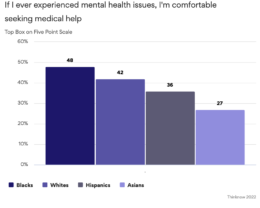
Cultural Barriers
Seeking help for oneself runs contrary to the collectivist ideal in Asian culture of placing the needs of others and society before one’s own. This is true in both East and South Asian cultures. The belief is so ingrained that some segments of the Asian American community, especially the foreign-born, don’t have the language to discuss mental health issues. They, instead, think of mental ailments as a physical condition without considering possible psychosocial origins. The concept of mental health was developed in the U.S. and Europe and mainly used western cultural concepts in diagnosis and treatment. The lack of connection to mental health awareness shows up in the data where most Asian Americans surveyed stated not perceiving mental health as a significant contributor to overall health and well-being.
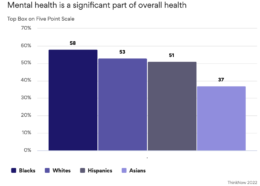
Even when they recognize they might need help with mental health issues, Asian Americans are less likely to feel comfortable seeking that help.
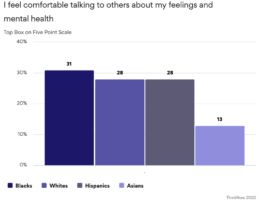
The Dark Side of The Model Majority Myth
Suicide is the leading cause of death among Asian American young adults ages 15-24. Asian youth can become overwhelmed by the expectations to succeed. Although the model majority myth may have its origins in Asian immigrants’ desire to succeed in the U.S., it is perpetuated in mainstream culture by teachers, business leaders, comedians, and the media. Asian students may perceive struggling with school pressures as letting both their parents and society down. Without good examples of what self-care looks like, fewer than 20% of Asian Americans know what to do to keep themselves mentally healthy.
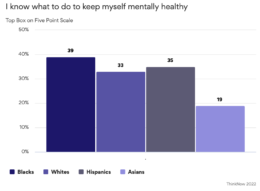
Culturally Appropriate Support
Since fewer Asian Americans currently seek mental healthcare compared to other groups, they are less likely to see other people like them in places that could help them, such as student health centers or clinics. This inadvertently confirms their belief that they don’t belong there. Recognizing this disparity is the first step toward creating inviting spaces for Asian Americans to seek mental health services. Language is not as much of an issue for Asian youth but is a real barrier for older, foreign-born groups. Having in-language material and resources available can be lifesaving.
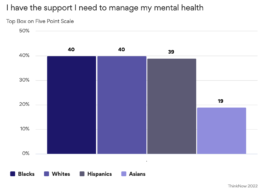
Training healthcare providers to recognize the additional barriers their Asian American patients may be experiencing can also help increase the uptake of services in this demographic group. Healthcare workers must be culturally competent, understanding the nuances impacting their Asian American patients’ decisions.
How We Can All Help
The model minority myth requires society at large to perpetuate it. Reflecting on our beliefs about what a scientist, artist or carpenter looks like can help open more doors for Asian Americans struggling to conform to certain ideals. Also, asking Asian Americans “where they’re from” is still far too common. What seems like an innocent question to get to know one better actually “others” that person for it makes assumptions about what an American should look like.
Finally, normalizing mental healthcare as something everyone in society can benefit from is vital. By sharing our own challenges, we can inspire Americans of all ethnic backgrounds to accept mental healthcare as an integral part of a well-rounded healthcare routine.





























